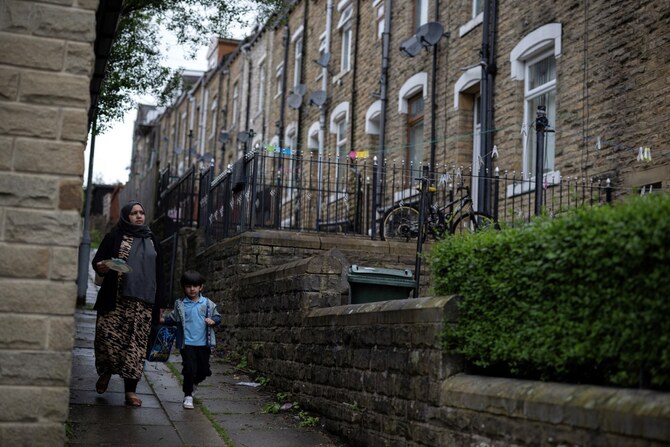London: Around a third of British Muslims avoid discussing their faith, a new study has shown, with fewer prepared to talk about Islam since far-right riots broke out across the UK in July, leading to what one expert calls a “sense of nervousness” in parts of the country’s Muslim community.
In a study published by the Institute for the Impact of Faith in Life, 34 percent of 2,835 Muslims surveyed on Aug. 30 and Sept. 1 agreed with the statement “I have avoided telling people about my faith in the last four weeks,” marking a 10 percent increase from the previous month.
Sixty percent also felt that the British media portray some religions “more negatively than others,” while 41 percent felt that all religions were painted in a bad light by the press in the past month.
In addition, 47 percent of respondents said they believed there should be more religion covered by the media in the UK.
Dr. Jake Scott, director of IIFL, said in a statement: “These statistics point to a desire amongst British Muslims to see a more balanced discussion on religion in the UK media, as well as more representation for Islam in that discussion.
“Following the riots and disturbances of the summer, it is clear that Muslims in Britain feel less safe and secure sharing their faith with others, whilst a majority see the media as playing a role in spreading a negative perception of faith, both in general and in particular.”
Chris Doyle, director of the Council for Arab-British Understanding, told Arab News that British Muslims had experienced similar trends in the aftermath of major terrorist incidents including 9/11 and the 2005 London bombings.
Many felt “in some ways intimidated … because of a belief that many in the British population didn’t really understand Islam, didn’t understand or empathize in any way with British Muslims, and were collectively blaming them for the crimes of others,” he said.
“I think that what we see now with the dreadful, horrible, far-right riots this summer is a return to a sense of nervousness in the British-Muslim community.
“We’ve seen a lot of Islamophobia, a lot of anti-Muslim sentiment. We’ve had senior British politicians indulging in that, including, and in particular I’m afraid, within the Conservative Party where Islamophobia is a real problem, including among leadership candidates in the current election.
“I think this is really the backdrop as to why British Muslims are perhaps feeling somewhat nervous.”
Doyle said there is a perception that media coverage of religion in the UK is increasingly influenced by secularism, which has led to the ignoring or “belittling” of people of faith.
“British Muslims do feel that there’s an Islamophobic climate. We know also, of course, the British-Jewish community is very nervous at the increase in antisemitism, anti-Jewish sentiment and hate crimes as well.
“So all of this does go into a bigger picture, and I think it’s something that those in public life, those in the media, those in politics need to … take careful note of.”
Doyle was skeptical, however, that an increase in religious coverage in the British media, or greater public knowledge of Islam, would dampen xenophobic sentiments generally.
“I think a lot of it is caught up in an anti-immigrant, nativist approach,” he said. “Many go for British Muslims, but actually this is merely code for British Asians or British Arabs — anybody who isn’t white Anglo-Saxon.
“So I think a lot of it is actually not so much to do with the religion itself, though some of it no doubt is, but actually antagonism to the other, to people who aren’t part of what the far right would like to see as native British people, native British culture.
“I think this is far more what’s at stake here. So I think you could get more religion in the media. I don’t think it would address that.”
In order to reverse the trend of British Muslims feeling that they cannot discuss their religion, or feel that they are targets of the media, Doyle said: “It requires people in leadership positions in public life — in politics, media — to be more understanding of British-Muslim concerns, not to buy into that narrative of the far right that somehow British Muslims aren’t properly British.”
He added: “It’s also important that we ensure that British Muslims are able to access all areas of British public life.
“I think there’s been a lot of positive moves in that direction — we have a Muslim mayor of London and so forth. We’ve had British Muslims in the Cabinet.
“Such moves, where qualified people are able to get the highest offices regardless of their background, identity and faith, I think that’s absolutely vital.”














